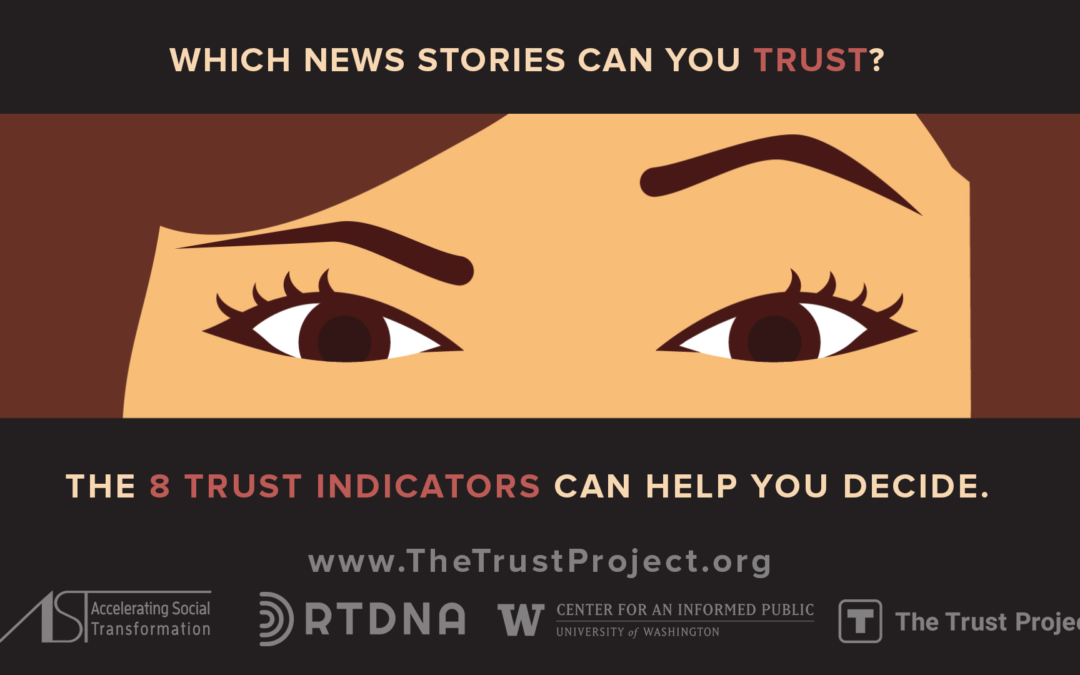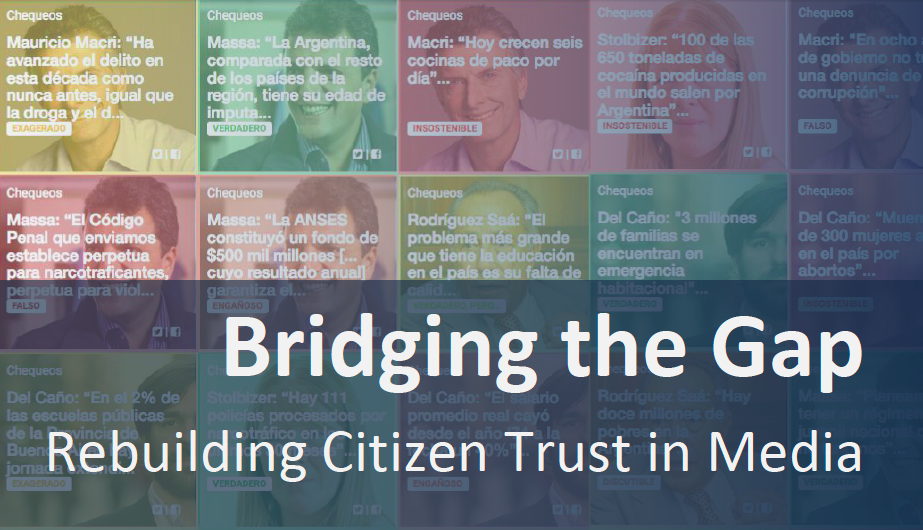
Here are the insider tricks to figure out if a news item is true or not. Please share this PSA which contains some basic media literacy guidelines so that you don’t get duped by those who want to use you to spread their lies.
https://www.youtube.com/watch?v=i3rDP_boUYw&feature=youtu.be

I’m happy to see this new initiative that helps us identify the real journalists who offer trusted work, with accountability. Now we need to get more media literacy, so consumers will know to use tools like this Transparency Tracker to select reality-based, fact-based journalism providers instead of falling prey to the propagandists, newsbots and conspiracy theorists who are making money or gaining power by duping us into spreading and believing stuff that isn’t true.
Most importantly, tools like this confirm that some content is much more trustworthy than other content You CAN figure out what is useful news from what is propaganda. Don’t be left powerless by cynicism that tells you everything is a scam. If you decide that, you will never be able to hold the bad guys to account.
Journalism has never been, and will never be, perfect. But it is a tragedy when people don’t understand who is working in the public interest, to help empower them with information, versus all those jerks who are trying to sell them something for their own amusement or ill-gotten gains.

Living in the heart of darkness (Silicon Valley) for the past three months has taught me that we cannot pin our hopes for American democracy on the great media platforms: Facebook, Google, Twitter, YouTube, et. al. Their leaders seem to know only how to make money from us, and the tools they have invented are out of control. The companies are proving incapable of dealing with the information dystopia they have created. Digital innocents think they are accessing an agnostic information universe when they click onto these platforms. Instead, we are getting the content most likely to confirm our prejudices, based on all the private information we have shared through our online search, posting, shopping and “like” histories.
Mark Zuckerberg is the man in the hot seat, forced to defend the tech platforms’ vampire business model to Congress. People are just beginning to wake up to the problems generated by these data-sucking companies. Facebook now has 2 billion members around the world, whose private preferences are the “product” Facebook has given to any “advertiser” that comes along. Because they know so much about us, Facebook’s clients–malicious Russian robots and conspiracy theorists included–can figure out exactly how to win our trust. Analysts who know Facebook intimately, including Kara Swisher of RECODE and Farhad Manooj of the New York Times, confirm that Zuckerberg and his peers have no idea how to deal with, or even measure, the profound social and political impacts they have unleashed.
Google, which has the most data of all, has done a marginally better job of weaning its search engine off robotic conspiracy theories. But it has failed to care much about the fake news and hate speech its subsidiary, YouTube, turns up as preferred content.
Belatedly, as the techlash gains force, some folks in Silicon Valley are thinking about software solutions. Below is one look at whether the algorithms that got us into so much trouble can reverse course, and nurture our better natures. This depends entirely on the values and priorities of the people writing the code for it. Given the track record so far, this is not reassuring. We need laws that companies must follow. This requires government policies, demanded by media literate citizens using their real intelligence.
https://motherboard.vice.com/en_us/article/zmgza5/knowhere-ai-news-site-profile?utm_campaign=be41b4895a-EMAIL_CAMPAIGN_2018_04_06&utm_medium=email&utm_source=API+Need+to+Know+newsletter&utm_term=0_e3bf78af04-be41b4895a-45842181
I don’t think that ceding more power to algorithms is the best solution. It may be part of the response, but it can’t be the whole story. I like the idea floated by Markos Kounalakis: create a Mayor of Facebook. Create accountability through human, democratic systems, so that people can help other people when they are doxxed, their identities are stolen, and their safety is compromised by viral hate videos. Here is Markos’s brilliant idea:
http://www.markoskounalakis.com/blog/2018/4/6/facebook-and-its-global-village-need-a-mayor-to-represent-us

—January 2018
What is the truth about journalism?
Journalism is always a bit of a mess. People’s memories are usually flawed. Eyewitnesses differ about the same event. The moment a story passes from one person to the next, it changes. This is only human. And then there is a whole new category to worry about: opinion pretending it is news. Appealing stories, spread through our trusted social media sources, may be secretly designed to persuade us of something. It may be fake news that has no basis in fact.
The response: cynicism
In such a world, it is easy to give up on all news sources, even though we still need information from somewhere, in order to optimize our future. Conspiracies are attractive when we feel we can’t trust anybody but the ideas and people we already know.
How we are manipulated
Reporters who are trying to figure out what is actually going on and tell it honestly–from an nonpartisan referee’s point of view–are increasingly dismissed as creating “fake news,” by the people who need them the most. It isn’t just the professional journalists’ execution of the news story that is questioned—it is their motive. This loss of credibility is a big problem for our entire democracy, as politicians make policy based on fake “alternative facts” that they make up, and attack the reporters who are actually trying—on our behalf–to hold these politicians accountable.
The truth
Are most of the mainstream media out to brainwash us? Of course not. Are the talk show pundits who are transparent about their biases more honest about the facts? It may feel that way, but actually–no! Are the “inside” scoops and conspiracies we are hearing about through social media truer than what we read in the newspaper? Probably not. Opinions are different from facts. We have to pay attention to know who truly has our back and wants us to know what’s actually going on—and who is trying to manipulate us.
We don’t want to be like Edgar Maddison Welch, who thought he was a superhero, blazing into Comet Pizza in Washington, D.C. with his assault rifle to save children from a sex ring he heard about on the Infowars website and social media, that doesn’t exist. He is serving four years in prison, for acting on what he later decided wasn’t “good intelligence.” (It was part of the huge fake news campaign against Hillary Clinton, some of it spread by Russian bots that many people still believe despite the evidence that it is all made up.)
[New York Times Pizzagate Story]
The bottom line
Examining the motive of a reporter is a good thing. But simply deciding that they are all “enemies of the people” and trying to con us, is not the smart way to gather power and knowledge for ourselves. In my experience, it is charlatans with bad motives who are the ones most loudly telling us to mistrust the press in general, to ignore the referees of mainstream media.
The easy answers are rarely the most honest or helpful ones. Opinion is not good enough. Evidence is the key to navigating this crazy world.
The challenge
Just having the news story confirm what I already believe is a terrible basis for trust. Just listening to one type of news source or pundit, without understanding where they got the story, is also a fast track to being manipulated.
Take action to prevent being manipulated
The next time I am told that what I am hearing is “fake news,” I will take a minute or two to look within the story for where the facts in the story came from, and what evidence is offered to back them up. Just saying, as Bill O’Reilly loves to do, “I have someone inside the organization” is not evidence.
- What news sources are they are using (are they quoting people who actually have some expertise and evidence? Are they listening to only Republicans or only Democrats, quoting business leaders and not consumers, media pundits? Are they finding people who actually have deep experience with the subject?
- What is the track record of this news source? Do they generally try to provide fair and carefully checked reports, or are they just spouting opinions without evidence to back them up? Stirring up conspiracies to make money or gain power from your support? If you challenge them, will they offer you real evidence to back up their claims?
- You can save a lot of time by checking the story with the fact-checking organizations. Politifact, Factcheck.org and other fact-checking organizations’ tone can be annoying, but the facts they present about the most popular stories and myths may be an important correction to what we thought we knew. Knowledge is power. It’s worth our time to pay some attention to the details.
I worked with Anya Schiffrin and her team of experts from Columbia University, to help sort out the journalistic truth-tellers from the “fake news” opinion pundits. For further study of this issue, here is the report, Bridging the Gap.

Published in the January 2005 issue of Nieman Reports Magazine.
Journalism will survive, but it might appear in the form of Web sites designed for people who want to check in on the real news when they don’t get the jokes on the Jon Stewart’s “Daily Show.”
It is tragic that we’ve come to this. For years we’ve been warned that great journalism is being tainted by all this ersatz stuff. Too many reporters are chasing too few stories and conveying them with more hype than meaning. People are suffering from news fatigue, along with compassion and political fatigue.
Audiences flee to the blogosphere and talk shows, where the chatterati seem more candid and therefore, honest, seducing audiences by confirming their prejudices. The passion for “attitude” plays well in our attention economy, but it’s bad for news. Journalists become no different than salesmen and jesters, except they’re usually less amusing.
Real journalism will recover, but only if its supporters take action. First, they should get out the plastic sheeting and duct tape and wall off everything about celebrities, movies, Laci Peterson, rumor, prediction, and a lot of other popular stuff. Take a page out of factcheck.org – the most admired Web site of this campaign year. Stay with the basics. Don’t just repeat someone else’s story. Do original reporting. Help us understand what’s a lie and what’s the truth, and why this matters.
Journalism that still tries to do this is better now than ever. It is found in the detailed take-outs in The New York Times and other newspapers which separate myths from realities, about aluminum tubes in Iraq, John Kerry and George Bush during the Vietnam era, and other hotly debated issues. But these days this kind of careful, researched journalism has more enemies than friends. “You’re either for us or against us,” President Bush declared after 9/11, in message that was absorbed too well by the U.S. media.
To win back people who want to know what’s really going on, journalists need to return to what they do best: providing verified information that is, in Bill Kovach’s and Tom Rosenstiel’s phrase, “comprehensive and proportionate.” News outlets also need to get more credit when they do this; even their best work is often taken for granted by those who pay close attention or dismissed by those who do not.
It’s time to launch a public education campaign and take back the phrases “fair and balanced, and “no spin” from those who claim them, but do just the opposite. Journalism doesn’t need to give up and join the overtly biased. Instead, it needs:
- A effective consumer movement
- An educational effort
- New business models
- A lot more lawyers
It’s way overdue to use these tools to reverse the 35-year cultural war against the mainstream media, led by folks like Roger Ailes on the right and Noam Chomsky on the left. These critics, who never appreciated the honest efforts of good journalists, exaggerate and exploit high-profile mistakes by major news organizations. When the federal government, which rarely finds scrutiny convenient, subpoenas reporters to hand over telephone records that go far beyond the scope of the Valerie Plame inquiry, a lot more lawyers are needed. When reporters can’t protect sources, they can’t hold the powerful accountable.
Fortunately, a long-needed media consumer movement is gaining momentum. Organized through the Internet, people successfully challenged Sinclair Broadcast Group’s decision to provide blatantly erroneous, partisan content during the president election. Before that they forced the Federal Communications Commission to rollback its loosening of cross-ownership rules. Journalism companies should get on the right side of this issue, even though the business model for independent journalism is under severe stress.
The rise of factcheck.org is evidence that journalism can morph into new formats and succeed at its core task of holding the powerful accountable and providing access for citizens to information they need. But it’s a nonprofit operation. Most journalism cannot enjoy that protection. Mainstream journalists often confront market-driven executives who demand cross-promotion of entertainment products by their news divisions. Niche markets might be journalism’s best hope, as National Public Radio illustrates, even if news balkanization is not good for democracy. Better business models must be found, fast.
Finally, a return to a civic education curriculum would help. Those who teach media literacy should move beyond deconstructing messages to helping students find reliable information. They need to show how to value real journalism – by looking for transparency, verification, independence, context and proportionality. Let’s be sure that when the audience comes back to look for this, they’ll be able to find it.





